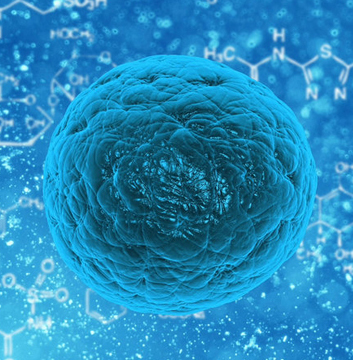
Cancer cells can evade the body’s immune defenses by exploiting a normally helpful and ubiquitous group of molecules known as mucins. Now, Stanford researchers have engineered a biomolecule that removes mucins specifically from cancer cells – a discovery that could play a significant role in future therapies for cancer. Mucins are sugar-coated proteins whose primary function is to defend the body against physical insults and pathogens. But cancer cells can co-opt mucins to aid their survival. Cutting mucins off cancer cells is a plausible therapy, but mucins exist in various forms on every cell in mammalian bodies, so targeting mucins indiscriminately could have unforeseen side effects.
The solution devised by the Stanford-led research team is essentially an enzyme-based scissors composed of a mucinase – a protein-cutting enzyme (called a protease) that specifically cuts mucins – fused to a cancer-cell-targeting nanobody (an antibody fragment). This two-part biomolecule selectively targets and prunes only mucins associated with specific cancer cells.
This study, carried out in lab-grown human cancer cells and in mouse studies that simulated human breast and lung cancer, found the biomolecule treatment significantly reduced tumor growth and increased survival. Their findings, published Aug. 3 in Nature Biotechnology, have broad applications as mucins are associated with many diseases, including cystic fibrosis, respiratory diseases, and viruses.
“We found that we could target this mucinase to cancer cells, use it to remove mucins from those cancer cells, and there was a therapeutic benefit,” said senior author Carolyn Bertozzi, the Anne T. and Robert M. Bass professor in Stanford’s School of Humanities and Sciences.
Graduate scholar Gabrielle “Gabby” Tender is co-lead author on the study with two former Bertozzi lab researchers – Kayvon Pedram, a group leader at HHMI’s Janelia Research Campus, and D. Judy Shon, a postdoctoral scholar at Caltech.
Although cancer cells use mucins for nefarious purposes, mucins are generally good. But when mucins go bad, they’re awful.
“Mucins play important roles throughout the body, such as forming mucus in our gut and lungs, and protecting us from pathogens,” said Tender. “Cancers dial this natural process up to 11, hijacking the functions of mucins to protect themselves and spread throughout the body.”
